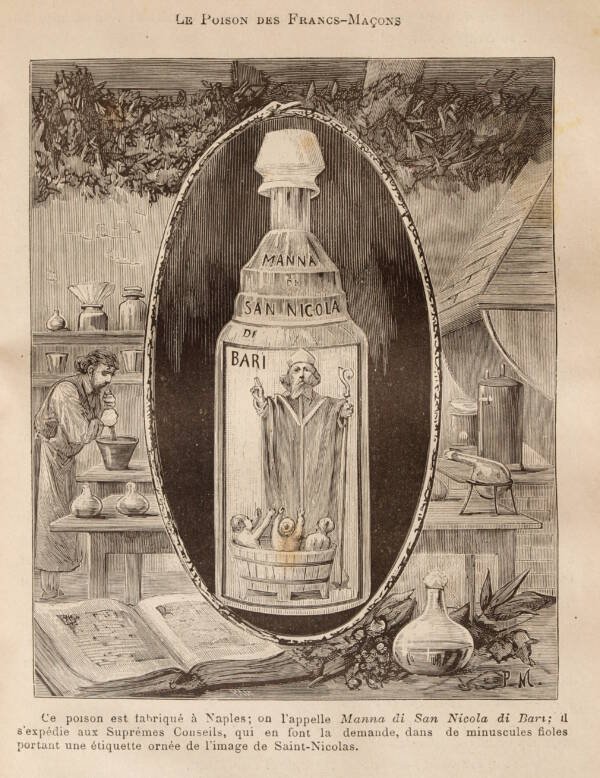Giulia Tofana: He’s just a guy, poison him with arsenic
/Giulia Tofana, often referred to as the "Queen of Poison," was a notorious figure in 17th-century Italy, known for her dark craft of creating deadly concoctions. Born in the early 17th century, Tofana became infamous for providing poison to women seeking a way out of oppressive marriages or desperate situations. Her story is a fascinating and chilling chapter in the history of poisonings and female empowerment.
When Guilia was 13, a woman named Thofania d'Amado, who was probably her mother, was executed for poisoning what some have claimed to be her own spouse. Tofana later used her mother's recipe to continue her legacy afterward. Talk about family traditions…
Tofana's life unfolded during a time when women had limited agency and were often trapped in loveless or abusive marriages. The societal norms of the 17th century placed heavy restrictions on women, leaving them with few options for escape. In this environment, Giulia Tofana emerged as an unlikely yet intriguing figure who offered an alternative to those suffering in silence. A saviour or serial killer by proxy?
What set Tofana apart was her expertise in creating poisons that were both deadly and untraceable. The poisonous concoctions became infamous for their efficacy and subtlety. Tofana's clientele primarily consisted of women who sought liberation from oppressive husbands or unwanted suitors. Catcallers bewarned. The toxic substances she supplied allowed these women to escape their dire circumstances, albeit through a dark and dangerous path.
Tofana's notoriety grew as her poisonous trade flourished, and whispers of her activities spread through the streets of Rome. The secrecy surrounding her operation added an air of mystique, as Tofana operated discreetly, avoiding the prying eyes of authorities. Her clandestine network of clients and collaborators helped shield her from the consequences of her deadly trade.
Aqua Tofana was often disguised as “Manna of St Nicholas of Bari,” Which was an ointment for blemishes.
The Queen of Poison's most infamous creation was a poison known as Aqua Tofana. This lethal concoction was colorless, tasteless, and odorless, making it nearly impossible to detect. Its insidious nature allowed those who used it to administer the poison without raising suspicion. The potency of Aqua Tofana made it a weapon of choice for women seeking a way to break free from oppressive relationships.
Tofana's activities eventually caught the attention of the authorities, and in 1659, her dark empire began to crumble. Accused of being involved in the deaths of numerous individuals, Tofana and her daughter were arrested. Under the threat of torture, Tofana confessed to her crimes and implicated many others. The trial that followed revealed the extent of her deadly enterprise and the desperation that led women to seek her services.
Turns out Tofana couldn’t escape the ultimate cancellation — execution. The tale of the Queen of Poison became a cautionary one, illustrating the extremes to which individuals could be driven when faced with societal constraints and oppression. Tofana's story also raises questions about the blurred line between criminality and desperation, highlighting the lengths some may go to escape untenable situations.
While Tofana's actions were undoubtedly criminal, her story has been revisited and reinterpreted through various lenses. Some see her as a symbol of resistance against a patriarchal society that offered limited options to women. Others view her as a cunning and dangerous criminal who exploited the vulnerabilities of her clients for personal gain. I personally see her as the original girlboss..
Giulia Tofana, the Queen of Poison, remains a compelling and enigmatic figure in history. Her life and deeds provide a glimpse into the challenges faced by women in the 17th century and the extremes to which some were driven in their quest for freedom. The tale of Aqua Tofana serves as a dark reminder of the lengths individuals may go to when confronted with oppressive circumstances.
Hi, my name is Abby Wallingford. I’m currently in my second year in Professional Writing at Algonquin College. I have always been interested in reading and writing. Ever since I was young I have been coming up with ideas and writing them down, even making edits to books I would read in attempts to “make them better”. If I’m not dreaming up a new plot or world for a book, I’m dreaming of traveling to the historic places where my inspiration stems from. I’m fascinated with all things history and mythology and can’t wait to share these grim and grotesque stories of the past with you.





